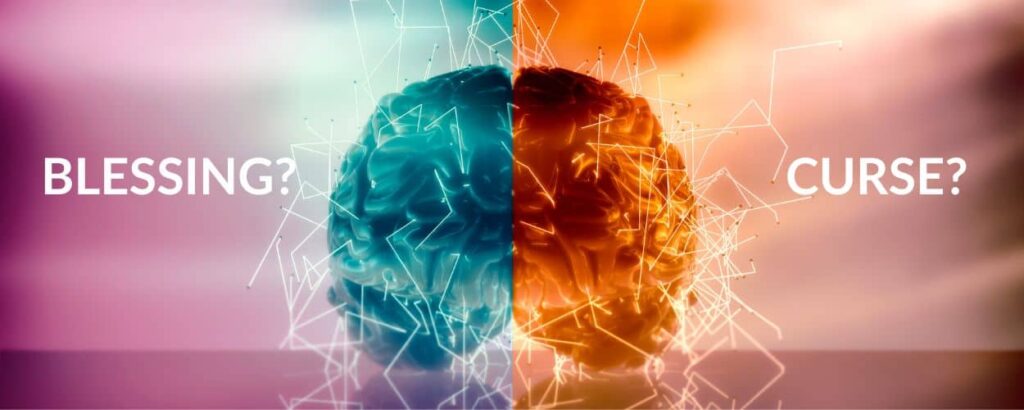
Is The Human Brain A Fascinating Blessing Or A Curse?
Do you think that the human brain is a fascinating blessing, or do you think at times, that it is a bit of a curse? When you look at your pet, what do you notice?
Transcript
Do you think that the human brain is a fascinating blessing, or do you think at times, it is a bit of a curse?
When you look at your pet, your dog, especially, but also your cat if you have one, what do you notice? You probably notice that they’re interested in food, being petted, being walked, and sleeping. That’s about it. (Don’t get me wrong. I love our dog! Until recently, we had two.)
Humans are much more complicated. Unlike a dog or cat, we don’t just have the lizard brain and the mammalian brain, but we also have a third brain, the neocortex. The neocortex allows us to explore questions that are much more complex than sniffing a spot, like a dog does, to find out which other dog’s been there.
Humans ask questions, like “Where did we come from? What is the purpose of our life? How does the universe work? What’s going on with God?” and so forth. We are able to be curious. Hugh Ross has written some fascinating books. He says that human beings are the only beings that can be curious, which by the way, it makes me curious. How exactly are we so sure that that is the case? Still, I do believe him.
Our mindset is really what separates the situation of the brain being a blessing from one where the brain might turn into a curse. Our brain, as powerful as it is, can be a powerful blessing, or a powerful curse. That’s one way to put it.
- With the mind, we think about what we see as possible.
- We think about what is going to happen.
- We sometimes worry and turn specific worrisome ideas over and over in our heads. That leads to less pleasant results.
There’s a very strong connection between the mind and the results we get because in between are the feelings and the actions that we take or don’t take. It is the self-contained cosmos between the mind and the result. The only way we can step out of that is by saying,
“You know what? I don’t like this result. With this result I’m getting, there must be something I’m thinking that is not helping me now. “
That is powerful! It’s a powerful moment where you could say a breakdown leads to a breakthrough.
One of the things that is talked about a lot these days is the fight-flight or freeze response we have. This response is not a function of the higher brain (the neocortex), but it is a survival instinct.
The problem is that we often invoke that survival instinct in situations when it’s not needed. When that happens, the human brain can turn into a curse. We’re not even using the most precious part of the human brain at that point; The part that sets us apart from other living beings.
Therefore I invite all of us, myself included, to consider:
- What are your thoughts?
- Consider whether it is time to look at the same situation through a different, more empowering lens?
It starts as simple as what we talked about before, namely, making tasks you don’t like into pleasant ones by changing the way you look at it. The lens can change from “this is a house chore” to “I’m the steward of the house.” I bet you can hear that that sounds quite different because you chose to view it from the other vantage point? It’s so much more empowering.
Similarly, you might be thinking, “This person is out to get me!” That’s where the human brain turns into a curse. You could explore a different lens such as, “This person is preoccupied with some troubles they have on their own.”
Key Takeaways
In conclusion, whether the brain is a blessing or a curse, depends on what we do with our brain.
- Harnessing the brain as the fascinating blessing that it is (or could be) requires that we watch our thoughts.
- When we begin to feel the curse coming down on us, let’s stop and ask, “Hey, how am I looking at the situation? Am I using a lens that’s hurting me and turning my brain into a curse? Or is there a more powerful way to look at it? A lens that makes the situation much more palatable and quite possibly a blessing.“
I’m Curious
I am inviting you to observe your thoughts. When you catch yourself thinking a less-than-pleasant thought, stop and ask, “How am I looking at the situation? Am I using a lens that’s hurting me and turning my brain into a curse? How can I look at this in a more positive way?“
Metacognition, or thinking about what you think about is incredibly powerful. If we just let our thought run wild, we can become enslaved by them. We are blessed to be able to analyze our thoughts and refocus them. It isn’t necessary to be a Pollyanna, but we needn’t see ourselves as victims or failures when things do not go as we think they should. Stephie, once again you hit the nail on the head.
Very good… thank you, Jacquelyn! I had to look up what “Polyanna” means (an excessively cheerful or optimistic person). I agree we don’t need to be that – I’m not either.